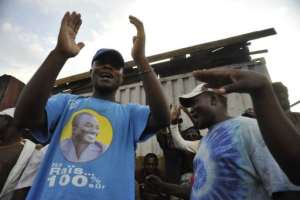
On the 30th of December 2018, the citizens of the Democratic Republic of Congo went to the polls to elect a new president and members of parliament to oversee the affairs of over 80 million people. Democratic Republic of Congo commonly referred to as DR Congo has had a tortuous experience with democratization since independence in 1960. The survival of democracy, peace and development in this mineral-rich country, especially after elections, must therefore be of global concern for several reasons.
The aftermath of recent post-election violence in many African countries such as Guinea , Sierra Leone , Zimbabwe , and Cameroon are clear indications of how poorly managed elections could throw a hitherto peaceful country into chaos. In this perspective, the effects of violence in DR Congo have the tendency to undermine security in neighboring countries of Central Africa Republic (CAR), South Sudan, Uganda, Rwanda, Burundi, Tanzania and Zambia.
With the high incidence of human and material poverty in contemporary DR Congo, any outbreak of post-election violence will further worsen and even reverse the paltry gains made by the outgoing government of Joseph Kabila. Development partners must therefore intensify effort to ensure that there is peace and stability in DR Congo.
The 2018 general elections in DR Congo was unique in different dimensions. Apart from the series of postponement that characterized the election, it is expected to be the first transition of power from a democratically elected government to another and the first time that the Kabila family is not running for the presidential office. Also, for the first time in the chequered democratic history of DR Congo, the country introduced electronic voting machines to speedy up counting and collation of election results. In Kinshasa, an inferno gutted a warehouse where thousands of electoral machines were stored. The destruction of the machine led the electoral umpire, known as CENI, to further postpone the elections by one week.
Additionally, the election had 21 presidential candidates, and 34,900 parliamentary candidates jostling for 500 national and 715 provincial seats. Besides, there was also the postponement of elections in three major regions of Beni, Yumbi and Butembo with a voter population of 1.26 million people. These regions are alleged to be the worst hit by the Ebola outbreak . Though it is ethically correct to avert the spread of the disease which would have, probably, been spurred by unrestrained movement of potential voters. It is politically expedient to also acknowledge that 1.26 million voters have been disenfranchised. The unique nature of the DR Congo elections coupled by the pre-election challenges raise concerns about the future of the country.
Current post-election reports emanating from international and local media, civil society organizations and election observers, the elections experienced some hitches especially in terms of delays in delivery of electoral materials, malfunctioning or missing voting machines , long queues at polling stations , internet shut down , and heavy rains in some parts of the Congo which caused delays in the voting process. It is important for the electoral management body to address some of these perceived irregularities before the final announcement of the results are made to nip in the bud the tendencies of conflict.
As the world patiently awaits the outcome of the election results, critical stakeholders such as the African Union, United Nations, politicians, religious leaders, particularly the catholic church, and civil society actors should advocate for peace and ensure that citizens remain calm even after declaration of results. Politicians and religious leaders must continually admonish their members to desist from violent acts. They should remind their members that the task of rebuilding DR Congo can only be achieved in a peaceful and harmonious environment.
Furthermore, media organizations (both local and international) have onerous roles to play in stabilizing the highly tension-soaked Congo. In this regard, media outlets such as radio, television and newspapers should be circumspect in their reportage of issues to ensure that voters do not resort to acts violence. Also, popular actors on social media platforms should desist from spreading fake news and flaring tensions.
The electoral management, CENI, should equally ensure that the voices of registered voters, in the three regions excluded from the 30th December elections, are heard. CENI should assure the 1.26 million disenfranchised voters that their votes will count come March 2019 when elections are expected to take place in the regions.
Regina Akosua Baiden, a civil society advocate and development practitioner, writes from Accra, Ghana.




 Lay KPMG audit report on SML-GRA contract before Parliament – Isaac Adongo tells...
Lay KPMG audit report on SML-GRA contract before Parliament – Isaac Adongo tells...
 Supervisor remanded for stabbing businessman with broken bottle and screwdriver
Supervisor remanded for stabbing businessman with broken bottle and screwdriver
 NDC watching EC and NPP closely on Returning Officer recruitment — Omane Boamah
NDC watching EC and NPP closely on Returning Officer recruitment — Omane Boamah
 Your decision to contest for president again is pathetic – Annoh-Dompreh blasts ...
Your decision to contest for president again is pathetic – Annoh-Dompreh blasts ...
 Election 2024: Security agencies ready to keep peace and secure the country — IG...
Election 2024: Security agencies ready to keep peace and secure the country — IG...
 People no longer place value in public basic schools; new uniforms, painting wil...
People no longer place value in public basic schools; new uniforms, painting wil...
 'Comedian' Paul Adom Otchere needs help – Sulemana Braimah
'Comedian' Paul Adom Otchere needs help – Sulemana Braimah
 Ejisu by-election: Only 33% of voters can be swayed by inducement — Global InfoA...
Ejisu by-election: Only 33% of voters can be swayed by inducement — Global InfoA...
 Minority will expose the beneficial owners of SML, recover funds paid to company...
Minority will expose the beneficial owners of SML, recover funds paid to company...
 Prof. Opoku-Agyemang has ‘decapitated’ the NPP’s strategies; don’t take them ser...
Prof. Opoku-Agyemang has ‘decapitated’ the NPP’s strategies; don’t take them ser...
